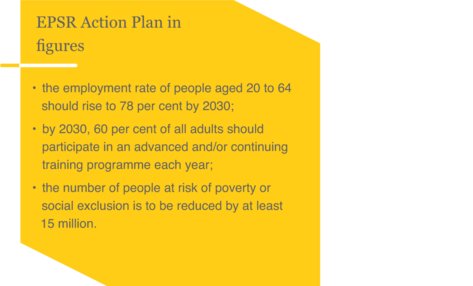 Getty Images Pro/anyaberkut
Getty Images Pro/anyaberkut
Fair working conditions in a changing world of work
The EU has already had extensive minimum regulations in the area of health and safety at work for years, thus having largely asserted its influence on national rules.
ed* Nr. 03/2022 – Chapter 4
By adopting comprehensive minimum regulations, it has created a good basis for protecting employees from as many risks as possible and enabling them to participate in working life for a long time.


Nicolas Schmit, Commissioner for Jobs and Social Rights
“The European Pillar of Social Rights is a turning point for workers’ rights and social protection in the EU. At the Social Summit in Porto in May 2021, EU leaders agreed to translate the Pillar into tangible actions for our citizens. With the 2030 social targets for employment, lifelong learning and poverty reduction, Member States have also set themselves specific targets to achieve just that.”

The EPSR picks up here with its Principle 10 (“Healthy, safe and well-adapted work environment and data protection”) and brings the importance of occupational health and safety back into the political foreground at European level as well. In particular, the changes brought about by ecological, digital and demographic change, as well as the transformation of the traditional working environment, pose new challenges for the Member States and make it necessary to adapt and review the existing rules. In order to maintain employability throughout the life cycle up to the rising retirement age, healthy and safe working conditions as well as more flexible framework conditions are essential.
Of central importance is also to restore employability and earning capacity through effective and efficient rehabilitation. After all, it is precisely the social benefit providers who, in specific cases, also have to bear the financial consequences of the failure of efforts to maintain and restore working, earning and employability to a large extent.
Therefore, prevention and rehabilitation must become even more important in the future. The European Commission has taken up this idea with its Principle 10 and given impetus to various further initiatives at European level.
For example, it presented further goals for improving occupational safety and health in its new strategic framework for health and safety at work1 published in 2021. In particular, new risks and opportunities, such as those arising from new forms of work, new technologies and digitisation, as well as the COVID-19 pandemic, have been included.
A core aspect of the new strategic framework is the Vision Zero approach – the vision of a world without work-related fatalities. Thus, the Vision Zero campaign, originally developed by the International Social Security Association (ISSA), with its golden rules for healthy work without accidents, is increasingly becoming a strategic tool, also in the European Union. The German Social Accident Insurance already anchored Vision Zero as a target in its prevention strategy in 2008.
In addition, specific legislative initiatives are also justified on the basis of Principle 10 of the EPSR. They aim to agree on common priorities in occupational safety and health. Here, for example, exposure to various hazardous substances used in existing and new sectors plays a major role.
The European Commission wants to prevent cancer, reproductive and respiratory diseases in the workplace. One example is the revision of the REACH Regulation announced in the EU Chemicals Strategy.
The European Commission has focused particularly on carcinogenic substances. In September 2022, after extensive scientific research, it proposed to reduce the current European limit value for the exposure of workers to asbestos in the workplace by a factor of 10. The topic is highly relevant for occupational safety and health in Germany and the entire EU, also in view of the upcoming wave of building renovations. What limit value the EU actually settles on will be the result of extensive discussions between the European Council and the European Parliament.
In addition, the EPSR has also provided numerous other impulses for tackling common challenges, for example with regard to new forms of work and technologies as well as changes in work organisation due to digitisation. The experience with the COVID-19 pandemic has certainly underlined once again the need for joint European action.

